A Note for Our Readers
I no longer offer 1:1 nutrition or functional health services, and I’m not accepting new clients for digestive or hormone-related support. This blog remains published as a helpful resource for women navigating these health challenges — especially those looking for clarity around their symptoms and well-being.
Today, my work is dedicated to helping Health Coaches, Practitioners, and Wellness Entrepreneurs grow profitable, sustainable businesses through private practice coaching and mentorship.
If you’re a wellness professional who’s ready to grow a thriving, values-aligned business without burning out, click here to learn more about my coaching programs.
And if you’re ready to build the kind of online health business that nourishes you financially, emotionally, and energetically, check out my signature program, the Nourished Business Accelerator™.
Thank you for being here and I wish you the best on your journey.
Are you eating too much fat in your diet? Keep reading to learn the warning signs and why a more balanced approach might be better for your health.
Dietary fats have always been a source of much debate in the health world. We went from demonizing fats during the 1980s to making them a staple of the keto diet craze over the last few years.
The recent obsession with high-fat diets is likely an over-response to the decades of fat-phobia that our country adhered to. For so many years, Americans had been living in fear of fat, especially saturated fats. We feared “clogged arteries” if we dared to eat egg yolks!
And now, thankfully, we’ve successfully challenged the belief that fat is bad. More and more women now understand that dietary fat is important for our health and wellbeing. They’ve learned that avoiding fat isn’t beneficial for our health.
But there has been an overcorrection of sorts, and now many people believe fat is a “free for all” part of a healthy diet. And contrary to what some high-fat enthusiasts might have you believe, there is such a thing as eating too much fat.
Too Much Fat?
Eating a diet that contains too much fat can actually be detrimental to your health.
Saturated fats should be a component of a healthy whole foods diet, but not the highlight. When we eat whole animal foods like meat and dairy, we are consuming saturated fats in healthful and reasonable amounts.
But, the common Paleo or Keto practice of throwing extra fat into coffee and extra tablespoons of butter or coconut oil to each meal could create some negative health outcomes.
Like everything else when it comes to health, the amount of fat that is “too much” for you is going to be completely different from anyone else. It can take some trial and error to figure out how much fat is right for YOUR body.
And I’m not suggesting that a low carb, high fat diet is always a problem for all people. But it’s definitely not the standard healthy diet that all people should follow. And there may be some unintended consequences of eating more fat than your body needs.
How Much Fat Do You Need?
In this article you’ll learn:
- What the different types of dietary fats are and which ones you should avoid
- Why fats are so important for optimal health
- Common symptoms of eating too much fat
- Myths about fat that we’ve been taught recently
- How to find your fat intake sweet spot
Ready to learn how to optimize your fat intake to help you feel your best? Let’s go!

Types of Dietary Fat
Before we work on adjusting your fat intake, let’s take a look at the different types of dietary fats.
Not all fats are created equal, and eating too much of the wrong type can be quite detrimental to your health.
While, on the other hand, consuming enough healthy fats can go a long way in improving your hormones, energy levels, and mood.
Knowing the difference between helpful and harmful fats is important as we learn to adjust our fat intake.
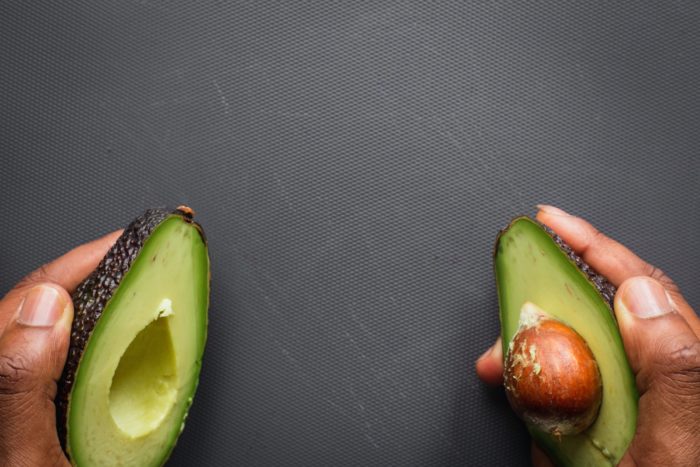
Unsaturated Fats
Unsaturated fats are the class of dietary fats you’ll want to focus on consuming most often.
These fats are generally beneficial and can improve cholesterol levels, ease inflammation, and decrease your risk of getting heart disease.
There are two types of unsaturated fats: monounsaturated fat and polyunsaturated fat. Both are liquid at room temperature but differ in their chemical makeup.
Common sources of monounsaturated fats are olive oil, avocado, eggs, and almonds. And you can get polyunsaturated fats by eating flaxseeds, walnuts, and fatty fish.
Omega-3 fatty acids are a unique type of polyunsaturated fat. Our bodies cannot make omega-3 fats, so they must come from a food source or supplement.
These essential fats, in particular, help guard against cardiovascular disease, improve beneficial gene expression, and help provide optimal protection against disease.
If you’re going to eat a diet high in fat, make sure that it includes primarily unsaturated ones.
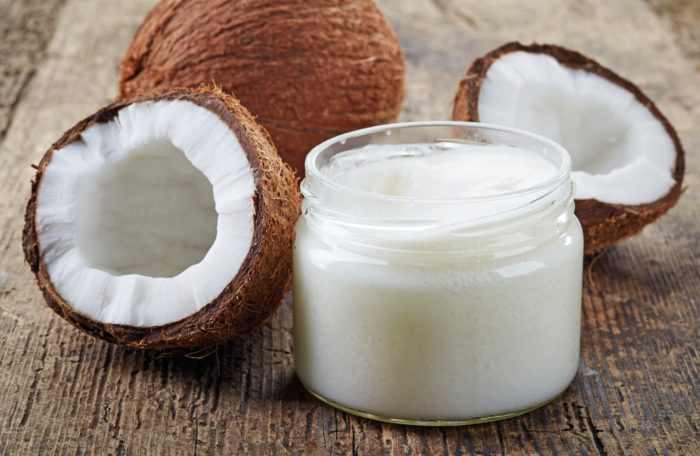
Saturated Fats
The health implications of consuming saturated fats aren’t always crystal clear.
Historically, we’ve viewed saturated fats as ones that increase your LDL cholesterol, and therefore, your risk of heart disease.
But recently, several studies have shown there isn’t enough evidence to conclude that saturated fat in your diet increases cardiovascular complications.
Either way, aim for replacing the majority of your saturated fat intake with unsaturated ones. This is going to be your best bet for keeping your heart healthy while still getting enough fat in your diet.
Saturated fats are solid at room temperature and are found in red meat, whole dairy products, and coconut oil.

Trans Fats
Heating vegetable oils in the presence of hydrogen gas – a process called hydrogenation – creates trans fats.
Partially hydrogenating oils makes them more stable for high-heat applications, gives them a longer shelf-life, and converts the fats into a solid.
This process also makes trans fats the most detrimental to your health.
Trans fats raise levels of the unhealthy LDL cholesterol, lower levels of the beneficial HDL cholesterol, create systemic inflammation, and contribute to insulin resistance.
Oils that contain large amounts of trans fats are vegetable shortening, margarine, and vegetable oils.

Why We Need Dietary Fats
Now that we know which types of dietary fats we should be consuming, let’s discuss why dietary fats are important to our health.
Many trendy diets have blown the necessity of fats out of proportion. But this doesn’t mean we don’t need dietary fat at all.
Fats are the building blocks of many important organs and processes in our bodies. We can slip from eating too much fat to not enough and affect our health and wellbeing.
Finding the right intake of fat for your body is a balancing act. And understanding the benefit of consuming healthy fats can help get us on the right track.
Dietary Fat and Hormones
Fats are the building blocks of our hormones. More specifically, hormones are produced using the cholesterol found in dietary fats.
Consuming enough healthy fats boosts your body’s ability to produce healthy levels of sex hormones, insulin, thyroid hormone, and cortisol.
If you have an irregular or painful menstrual cycle or have trouble balancing your blood sugar, increasing your intake of healthy fats could help.
Dietary Fat and Brain Function
Did you know that the human brain is 60% fat?
Our dietary fat intake is critical to healthy brain function and development.
In fact, a diet high in unsaturated fat can alter brain chemistry to allow for enhanced learning and slowing of cognitive decline.
And while fatty acids are essential for brain health, you don’t need to go overboard and eat too much fat to get there.
Ensure that you’re getting a few servings of healthy, unsaturated fats a day. This intake can support brain health while keeping you from overeating this macronutrient.
Dietary Fat and Inflammation
Unhealthy, trans fats, increase inflammation. But, diets high in unsaturated fats can actually reduce inflammation in your body.
People who eat a diet high in monounsaturated fats, specifically, had lower inflammatory markers in their blood than people who ate a standard Western diet.
Consuming the right amount of healthy fats can be so impactful for your health, especially if you suffer from a chronic inflammatory condition. If this is the case for you, following a Mediterranean diet template is a great place to start.

Symptoms of Eating Too Much Fat
The popularity of high-fat diets like the keto diet has brought this once feared macro back onto our plates again.
But, keto diets, and even lower carb, higher fat approaches, in general, don’t work for everyone. And, in my experience, they don’t work for most people.
Certain populations thrive on higher-fat diets, but they can be difficult for many women for a variety of reasons.
Filling your plate with too much fat can cause undesirable shifts in your metabolism and function of your body as a whole.
Many symptoms caused by eating a diet too high in fat are similar to other health conditions. And unfortunately, diet is often the last place we look to correct.
Here are some of the most common symptoms of eating too much fat:
- Weight gain
- Feeling tired after eating
- Diarrhea
- Acid reflux
- Heartburn
- Insulin resistance
- High cholesterol
These symptoms are very non-specific. But if you’re experiencing more than a few of them and are eating a diet high in fat, it might be time to start decreasing your fat intake.
Besides causing unpleasant symptoms, eating too much fat can be detrimental to your long-term health.
Here are three ways that eating too much fat can be harmful to your health.

Too Much Fat and Your Gut Bacteria
Our gut bacteria, known as our microbiome, work with many bodily systems to keep us healthy.
Would you like to save this post?
Your email address is 100% safe and will never be sent spam.
Our microbiome impacts everything from our gut health, brain function, mood, and immune system.
One of the best ways we can keep these beneficial gut bugs healthy (so they can keep us healthy in return) is by eating a wide variety of plant foods and fibers.
But, when you’re eating a diet higher in fat, fibers and plant foods are oftentimes the first to get pushed off the plate.
Research has shown that high-fat diets are linked to unfavorable changes in the microbiome. Both the diversity and the number of beneficial bacteria were reduced when study participants consumed a higher fat diet compared to one that moderated fat intake.
Don’t let study results like these push you to the other extreme though. You can consume too many plant fibers and vegetables, which can also damage your gut health.
And a typical Western diet isn’t beneficial for your microbiome either. My best advice to support your gut health is to eat a macro-balanced diet full of plenty of real food.
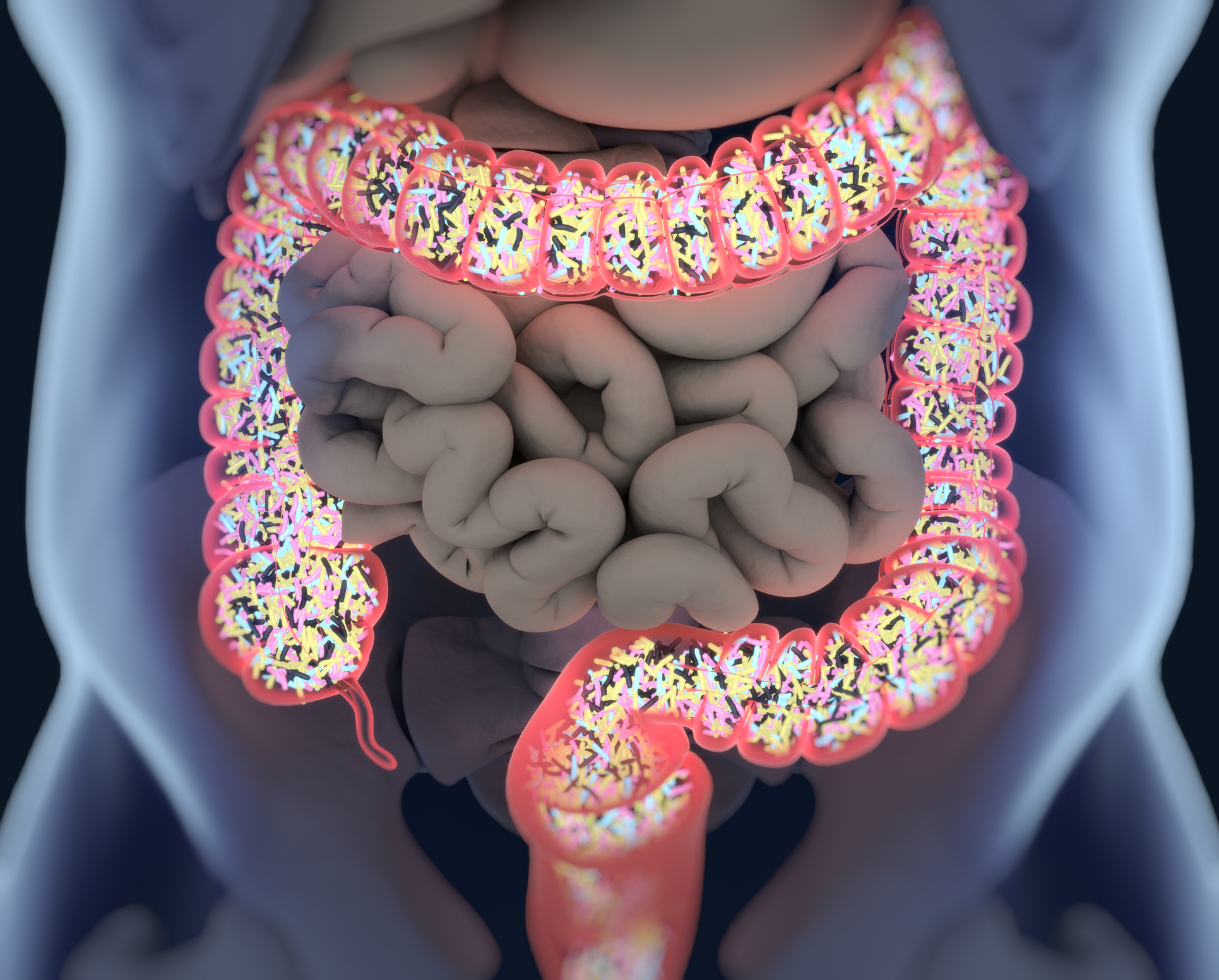
Saturated fats can negatively affect your microbiome
There is growing evidence that high saturated fat diets in particular can cause some unfavorable shifts in your gut bacteria. In this 2012 study, researchers studied the microbial shifts in gut bacteria that were eating three different high fat diets compared to a low fat control group.
The high fat mice diets consisted of 20% protein, 35% carbohydrate and 45% fat. But, the types of fats differed among the groups with one group eating safflower oil (high in polyunsaturated fats), another eating olive oil (high in monounsaturated fat) and the last group eating palm oil (high in saturated fat). The low fat control group was fed a diet consisting of 10% fat from palm oil.
The high saturated fat palm oil group showed a significant decrease in microbial diversity in their guts compared to the low fat group. In addition, the high fat palm oil group showed a shift in the composition of their gut bacteria with a significantly higher Firmicutes to Bacteroides ratio. A high Firmicutes to Bacteroides ratio is often correlated with obesity.
The other high fat groups did not show a significant difference in the microbial diversity or composition compared to the low fat control group. The researchers believe that the shift in the microbiome of the high saturated fat group was a direct result of the lower absorption of the saturated fat in small intestine causing the excess fat to overflow into the large intestine disrupting the microbiome.
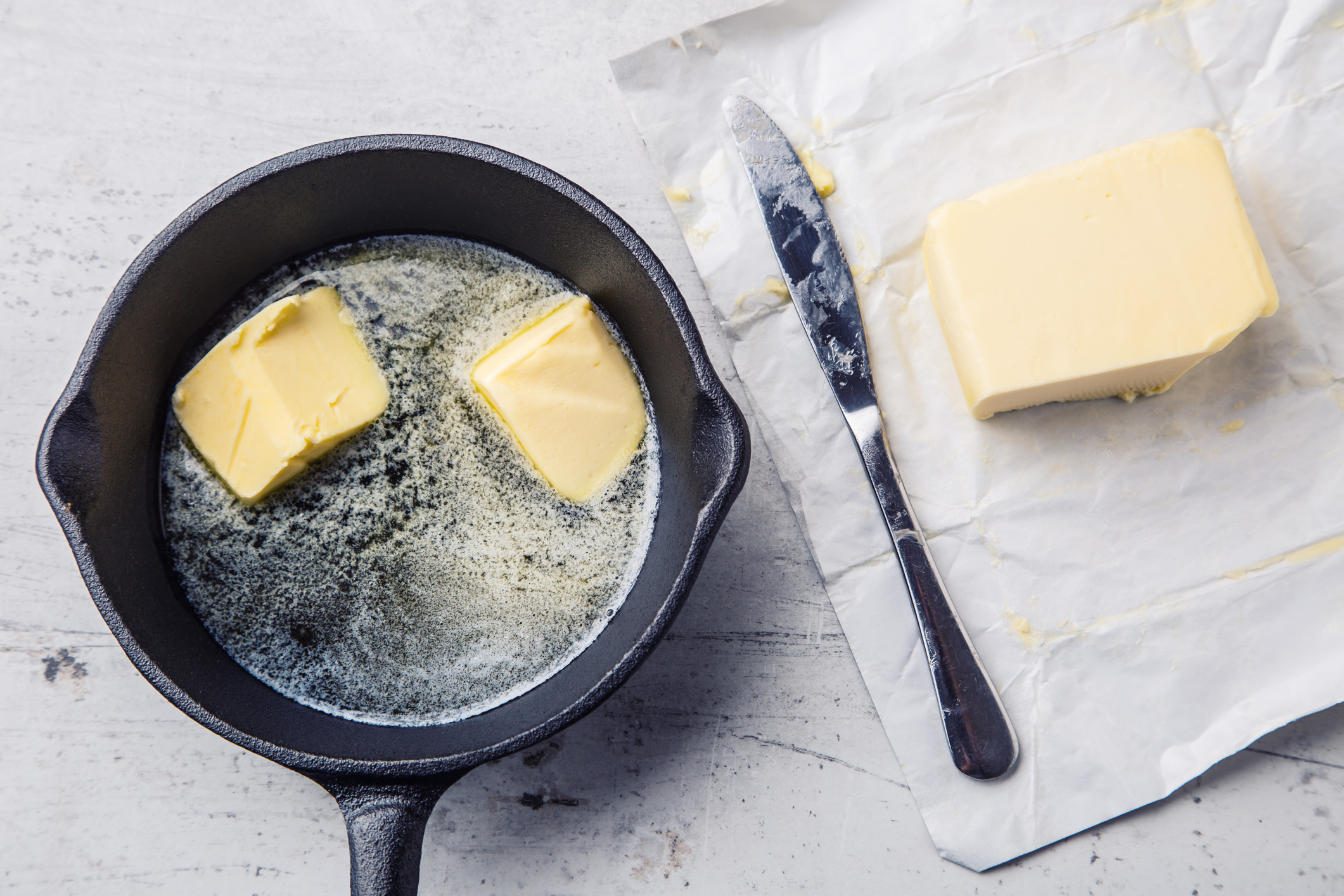
Higher fat diets might also affect metabolism and blood sugar
The palm oil group also exhibited changes in mucosal gene expression in the small intestine relating to fat metabolism not seen in the other high-fat groups. The particular genes expressed in the high-fat group are associated with metabolic disorders. These genes were not the only marker of metabolic disease seen in the palm oil group. These mice also had higher triglycerides and high body weights compared to the other mice.
Interestingly, there was no significant difference in glucose tolerance between the mice, but the high saturated fat mice released more insulin in order to maintain stable blood sugar levels compared to the other unsaturated high-fat groups.
The researchers believe that this “data suggests that fat type has an effect on plasma insulin levels, which might consequently lead to alterations in glucose homeostasis.” So, if the mice remained on this diet for longer than the 8 weeks of the study, they might have developed glucose intolerance.
More evidence of problematic effects on the gut
Another mouse study found some similar microbial upheaval when they placed the rodents on a diet high in isolated milk fats (37% of total calories). The researchers believe that the increased need for sulfur-rich bile from the liver to break down saturated fats seems to create a highly sulfurous environment in the gut that is unfavorable to many microbes. But some sulfur-loving species, like B. wadsworthia, thrive in this environment.
B. wadsworthia represented 6% of the total bacterial composition in the high milk fat mice, while the population of this bacteria in mice fed a highly unsaturated fat diet or a low-fat diet was infinitesimal, around 0.01% of total bacteria. The growth of this unwelcome visitor in the gut can lead to degradation of the gut lining, which can lead to autoimmune disease.
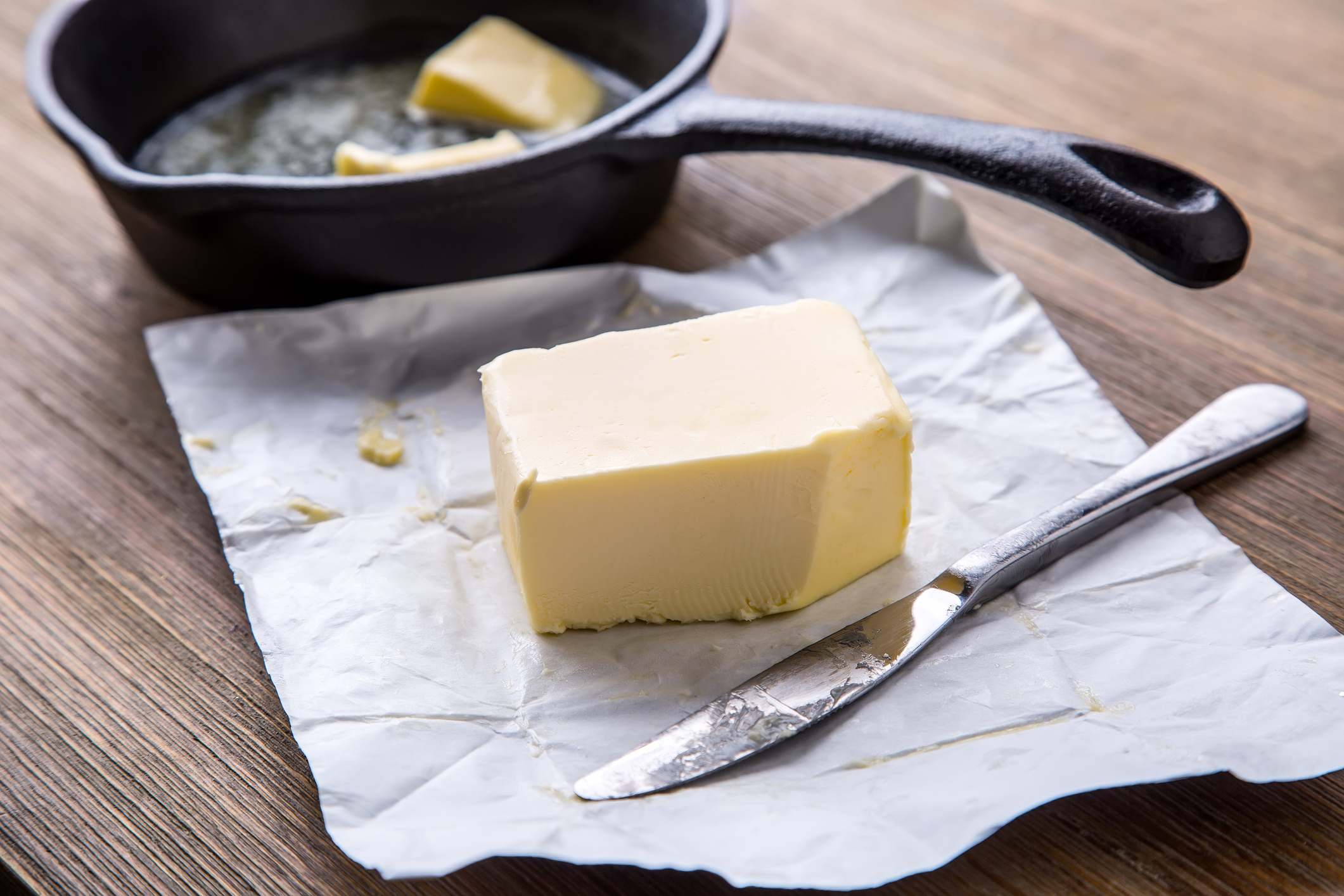
Although these studies are on mice, which does not guarantee the same results in humans, they seem to back up similar findings by Jeff Leach and the Human Gut Project on the negative impact of very low carb and high-fat diets on the microbiome.
The Human Gut Project has analyzed the stool of thousands of people. The goal is to better understand the landscape of a healthy microbiome.
Leach has written that many high fat Paleo dieters fail to properly feed their gut bacteria with fermentable fibers from fruits and starches. This results in lower amounts of short-chain fatty acid production in the colon and a more alkaline pH in the colon.
This pH change creates an environment that is unfavorable for Bifidobacteria and other beneficial microbes. It also opens the door for pathogens to take over.
Problems with increased PH
When this shift in microbes occurs, translocation of endotoxins (lipopolysaccharides) from the gut to the blood increases, which can lead to chronic low-grade inflammation associated with insulin resistance, obesity, and other chronic diseases. LPS is a component of the bacteria’s cell wall of gram-negative bacteria that is released as a protective mechanism for bacteria.
This endotoxin release even occurs in more acute consumption of a meal high in saturated fat. In this 2007 study, men who ate a meal that consisted of 50g of butter and with some toast had significantly higher levels of LPS in their blood after the meal in comparison to the levels found before the meal. The saturated fat meal even induced a stronger endotoxin response than smoking!
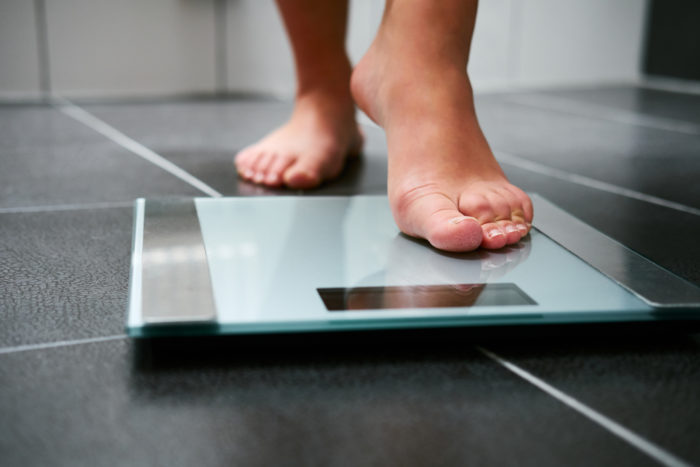
Too Much Fat and Weight Gain
Dietary fat is higher in calories per gram than the other two macronutrients. One gram of fat contains 9 calories, while one gram of carbs and protein only has 4 calories.
You’d have to eat more than twice as much protein or carbohydrates to get the same total calories from the same amount of fat.
This fact alone makes eating too much fat a major culprit behind unwanted weight gain.
But studies also show that dietary fat’s palatability and how our bodies process this macronutrient increase your likelihood of gaining weight when eating a diet high in fat.
And yes, one of the big draws of the ketogenic diet craze is that you’re able to lose weight fast. This ability to lose weight quickly is likely a response to being in ketosis. Not eating a high-fat diet in general.
If you’re still consuming plenty of carbs, however, eating too much fat could be behind your weight gain.
If you’ve been working out consistently but not seeing the progress you hoped for, decreasing your fat intake is one of the best ways to slow the weight gain.
Calories Still Matter!
The low carb or keto community claims that you can eat all the fat you want and still lose weight. But calories do matter when it comes to weight loss. And these claims often lead people to overindulge in added saturated fats like butter and coconut oil.
It’s easy to forget about the extra calories of the fats you cook with or add to your vegetables. Especially when you’re not measuring the amounts you are using.
Are you are finding it difficult to lose weight on a whole foods diet? Then you may benefit from reducing the amount of added fats and oils to your meals.
Fat Has Low Nutrient Density Per Calorie
Many saturated fats like butter and especially coconut oil are technically “nutrient-poor”. Dieters often add these fats to their meals at the expense of more nutrient-dense foods like fruits and vegetables. Nutrient-dense means there’s a high amount of vitamins and minerals compared to the number of calories in a specific food.
If you are eating half of your total calories from butter and coconut oil, you’re missing out on the phytonutrients, fermentable fibers, vitamins, and minerals from carb-containing fruits and vegetables.
These saturated fats are essentially empty calories. If they become the highlight of your diet, nutrient deficiencies and undernourishment can occur.

Too Much Fat and Metabolic Syndrome
Metabolic syndrome is a group of conditions that occur together and increase your risk of heart disease, stroke, and Type 2 Diabetes.
One likely cause of metabolic syndrome is the consumption of too much fat, specifically saturated and trans fats.
These types of fats increase low-density lipoprotein (LDL) cholesterol, which is often called “bad” cholesterol.
LDL cholesterol collects in the walls of your blood vessels, increasing your risk for heart disease or a heart attack.
Replacing your saturated and trans fat intake with unsaturated fats shows the best reduction in the risk of developing metabolic syndrome.
Unsaturated fats help to increase your levels of high-density lipoprotein (HDL) cholesterol, which can be protective against heart disease.
So, instead of replacing those unhealthy fats with carbs, aim for making most of your fat intake unsaturated.
Excessive Saturated Fats May Cause Insulin Resistance
Research indicates that saturated fats have a greater insulin response than other unsaturated fats. In a study of healthy subjects, a substitution of saturated fat for monounsaturated fats resulted in a reduction in insulin sensitivity.
The dieters were randomly placed on either a high saturated fat or a high monounsaturated fat diet. Both diets consisted of the same total energy from fat (37% of calories).
The high saturated fat dieters eating 17% of total calories from saturated fat and 14% of calories from monounsaturated fats showed a 12.5% decrease in insulin sensitivity. Dieters eating 8% of total calories from saturated fat and 23% of their calories from monounsaturated fats only saw a 8.8% increase in insulin sensitivity.
More Effects On Insulin
Another study determined that “if saturated fatty acids as a percentage of total energy were to decrease from 14% to 8%, there would be an 18% decrease in fasting insulin and a 25% decrease in postprandial insulin.”
If this insulin resistance is being seen at only 17% of calories from saturated fat, there is no doubt that individuals who are eating very low carb diets and high amounts of saturated fats could develop insulin resistance and carb intolerance. A very low carb Paleo diet easily exceeds 17% of total calories from saturated fats.
To put this into perspective, on a 2,000 calorie diet, 1 TBSP of butter/coconut oil is equivalent to about 6.3% of total calories. Just three tablespoons of added butter would put you at 18.9% of total calories from saturated. And that’s not even including any of the saturated fats consumed from meats, eggs, or dairy. Many low carb or Keto dieters can eat closer to 25-50% of their calories from saturated fats.
Many of my clients who have been on a very low carb diet for a while often don’t feel great when they eat fruit or starches. This carb intolerance may have developed from an overconsumption of saturated fats, leading to mild insulin resistance. In order to regain insulin resistance, low carb dieters may benefit in a reduction of saturated fats.
But Didn’t Our Ancestors Eat a Ton of Fats?
High-fat diets are often recommended in the Paleo/ancestral health community, where the goal is to imitate ancestral diets. But adding large quantities of extra fats to every meal is not a practice our ancestors could have easily engaged in.
Our ancestors did not have unlimited access to jars full of refined fats and oils like ghee, coconut oil, tallow, and other fats extracted from real foods.
This new practice of adding extra fats to an already “ancestral” diet creates levels of fat intake higher than what our ancestors would have consumed from meat, dairy, and other animal products.
Also, our ancestor’s wild animal sources had a different fatty acid profile than the largely grain-fed meats available today. Wild game meats tend to be leaner and lower in saturated fats compared to grain-fed domestic animals. In fact, grain-fed animals usually have 2-3 times more saturated fat and considerably less of the anti-inflammatory omega 3 fatty acids.
The high saturated fat diets that the Paleo community believes to be akin to what our ancestors ate are not a true comparison to the actual diets of our ancestors.
Don’t get me wrong… Saturated fats are fine to cook with and are even better when consumed in whole food form.
But adding heaping spoonfuls of butter and coconut oil to all your meals (or even your coffee) is probably not the best idea for overall good health. Nor is wrapping everything in bacon.

Finding Your Fat Intake Sweet Spot
Identifying that you are eating too much fat in your diet is an important first step. But now that you know you need to cut back, determining your fat intake sweet spot can be a little more difficult.
There is no one right dietary fat intake for everyone. And the fat intake that works best for your body might even vary from day-to-day. Your fat tolerance depends on a multitude of factors.
To start, I recommend consuming somewhere between 30-50% of your calories from fats. The exact total will depend on your carb and protein intake.
Aim for a style of eating that:
- fills you up
- makes you feel your best
- and moderates both fats and carbs with plenty of high-quality protein
Your body can also respond to fat intake differently at different times of the day. You might feel great eating a breakfast that is higher in fat. But that same amount of fat at dinner might not feel as good.
As you play around with the amount of fat that works best for you, you might find that supplementing with digestive enzymes before your high-fat meals helps with digestion.
Determining your ideal fat intake is a delicate balancing act. But once you get in tune with your body and watch for its cues, you’ll get a better idea of what works and doesn’t work for you.
Now it’s your turn – do you think you could be eating too much fat? What are some of the signs that made you think it’s time to adjust your fat intake?
Share your thoughts in the comments below.
This post may contain affiliate links. If you click on a link and make a purchase, I may receive a small commission.

+ show Comments
- Hide Comments
add a comment